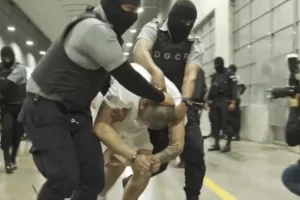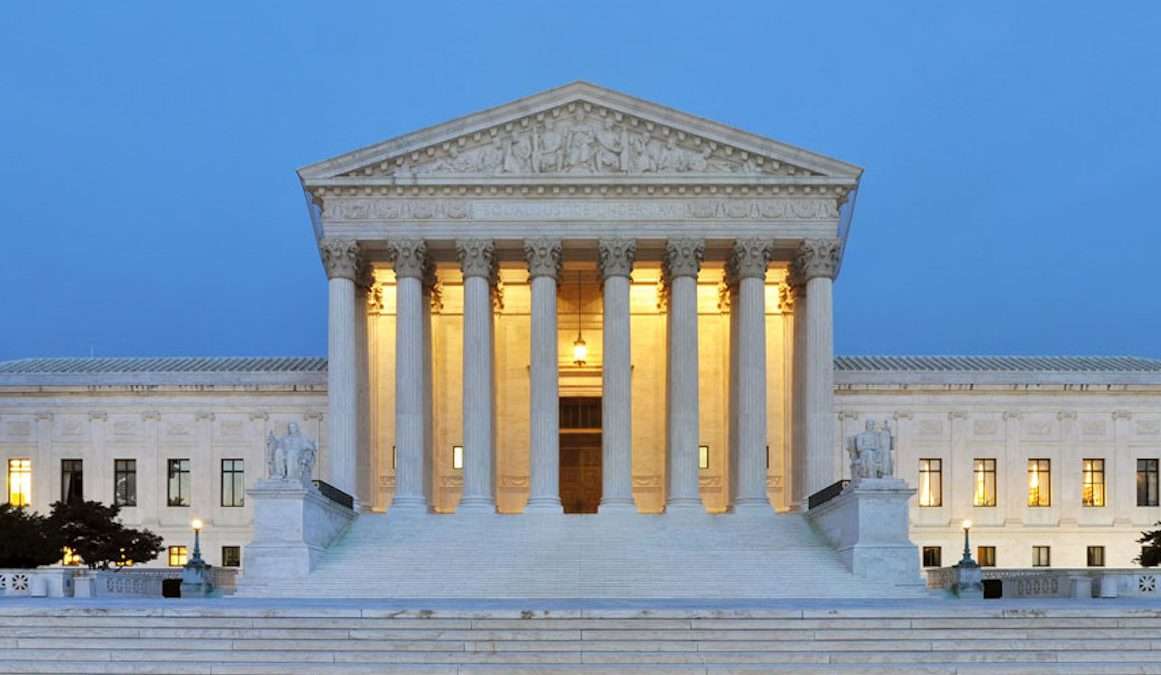 Kilmar Abrego Garcia, led by guards through the Terrorism Confinement Center in Tecoluca, El Salvador. (NA)
Kilmar Abrego Garcia, led by guards through the Terrorism Confinement Center in Tecoluca, El Salvador. (NA)
Yesterday, a federal district court ordered the Trump Administration to secure the return of Kilmar Abrego Garcia, a Salvadoran immigrant the government admits was illegally deported to El Salvador and then incarcerated in the horrendous CECOT prison, as part of a deal under which the Salvadoran government imprisons migrants deported by the US in exchange for a payment. Today, a unanimous appellate panel of the Fourth Circuit refused to stay the ruling. These decisions are obviously correct, and the Trump administration's argument to the contrary has extremely dangerous implications. It suggests that the government can deport and imprison anyone it wants - including US citizens - and then be immune from judicial review, so long as the incarceration is done by a foreign state, even one that is obviously doing it at the behest of the US government.
As the district court summarized its reasoning:
As Defendants acknowledge, they had no legal authority to arrest him, no justification to detain him, and no grounds to send him to El Salvador —let alone deliver him into one of the most dangerous prisons in the Western Hemisphere. Having confessed grievous error, the Defendants now argue that this Court lacks the power to hear this case, and they lack the power to order Abrego Garcia's return…. For the following reasons, their jurisdictional arguments fail as a matter of law. Further, to avoid clear irreparable harm, and because equity and justice compels it, the Court grants the narrowest, daresay only, relief warranted: to order that Defendants return Abrego Garcia to the United States.
Judge Paula Xinis goes on to point out the obvious flaw in the administration's position that Abrego Garcia is outside the control of the US government:
The Defendants' redressability argument, simply put, is that their placement of Abrego
Garcia in an El Salvadoran prison deprives them of any power to return him. Thus, they say, even if Abrego Garcia succeeds on the merits, Defendants are powerless to get him back. The facts demonstrate otherwise….
First, Defendants can and do return wrongfully removed migrants as a matter of course….
Second, Defendants unilaterally placed hundreds of detainees behind the walls of CECOT without ceding control over the detainees' fates, as the detainees are in CECOT "pending the United States' decision on their long-term disposition…." Unlike Abrego Garcia, for whom no reason exists to detain him, Defendants transported many individuals who had been detained in the United States while awaiting immigration proceedings. Yet, despite Defendants' power to transfer those awaiting hearings to CECOT for a "good price," Defendants disclaim any ability to secure their return, including Abrego Garcia….
[T]he record reflects that Defendants have "outsource[d] part of the [United States'] prison system….."See also U.S. Dep't of Homeland Sec., How It's Going, DHS,
https://www.dhs.gov/medialibrary/assets/video/59108 (last visited Apr. 4, 2025) (quoting Defendant Noem: "This facility is one of the tools in our toolkit that we will use")." Thus, just as in any other contract facility, Defendants can and do maintain the power to secure and transport their detainees, Abrego Garcia included.
In the end, Defendants' redressability argument rings hollow. As their counsel suggested at the hearing, this is not about Defendants' inability to return Abrego Garcia, but their lack of desire.
Ultimately, this is not a case of the Salvadoran government imprisoning Abrego Garcia for its own reasons, but of them doing so at the behest of the US. For that reason, there is no real doubt that the Trump administration could get Abrego Garcia back, if it wanted to. El Salvador has no reason to hold him, except to carry out its agreement with Trump and wi favor with him.
The Fourth Circuit's reasoning is similar. A concurring opinion by Judges Thacker and King notes that Salvador President Nayib Bukele admits that the US has "outsourced" its prison system to his regime. Similarly, Trump Homeland Security Secretary Kristi Noem says that "This facility [CECOT] is one of the tools in our toolkit that we will use" [emphasis added].
The federal government cannot be allowed to circumvent its legal obligations by "outsourcing" imprisonment to foreign governments. Otherwise, it could use this "tool in our toolkit" to imprison whoever it wants - including US citizens - without due process, and without any judicial review. Big-name conservative Fourth Circuit Judge J. Harvie Wilkinson highlights this danger in his concurring opinion:
The facts of this case thus present the potential for a disturbing loophole: namely that the government could whisk individuals to foreign prisons in violation of court orders and then contend, invoking its Article II powers, that it is no longer their custodian, and there is nothing that can be done. It takes no small amount of imagination to understand that this is a path of perfect lawlessness, one that courts cannot condone.
Despite this threat, Judge Wilkinson would prefer that the courts merely order the administration to do what it can to "facilitate" Abrego Garcia's return, rather than order that the return actually be accomplished. To my mind, this distinction does not make any sense in a case where the foreign government in question is essentially a bought and paid for agent of the US. Outsourcing imprisonment cannot be get-out-of-jail-free card for the executive - or in this case, a put-in-jail-free card.
For these reasons, I am not impressed by co-blogger Josh Blackman's concerns that the courts are ordering the president to "negotiate with a foreign leader." When the president contracts with a foreign leader to imprison people at the behest of the United States, the US government retains full legal responsibility for that imprisonment. And if the imprisonment turns out to be illegal, it has a duty to put an end to it by, no less than if the person was incarcerated by the US directly. "Outsourcing" cannot be used to circumvent constitutional constraints on government power - especially not when liberty is so gravely threatened. Neither can it be used to circumvent legal restrictions on deportation - itself a severe constraint on liberty.
Sadly, this is not the only case where the Trump Administration has used imprisonment in El Salvador to try to circumvent the Constitution. It has done the same thing on a larger scale with its deportation of Venezuelans under the Alien Enemies Act. This action violates the Due Process Clause of the Fifth Amendment, and courts should order the government to reverse its illegal actions, and not accept the El Salvador ploy as an excuse.
The Trump administration has appealed Fourth Circuit ruling to the Supreme Court. Hopefully, the justices will affirm the lower courts, and reject the administration's attempt to set a dangerous precedent for shielding lawlessness with the help of compliant foreign states.
The post District Court and Fourth Circuit Order Trump Administration to Return Wrongfully Deported Immigrant appeared first on Reason.com.











 Bengali (Bangladesh) ·
Bengali (Bangladesh) ·  English (United States) ·
English (United States) ·